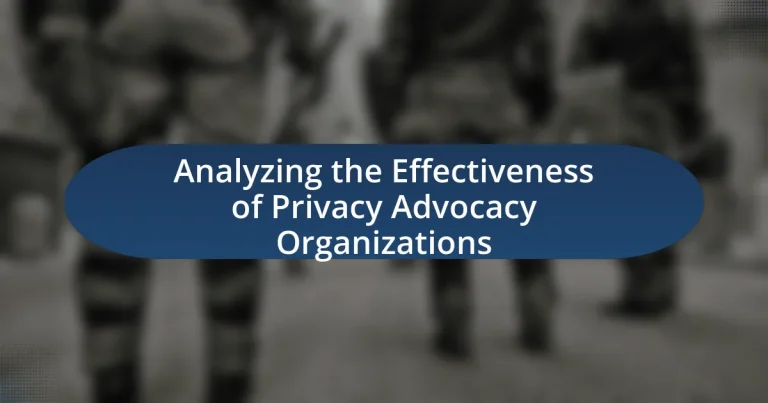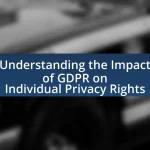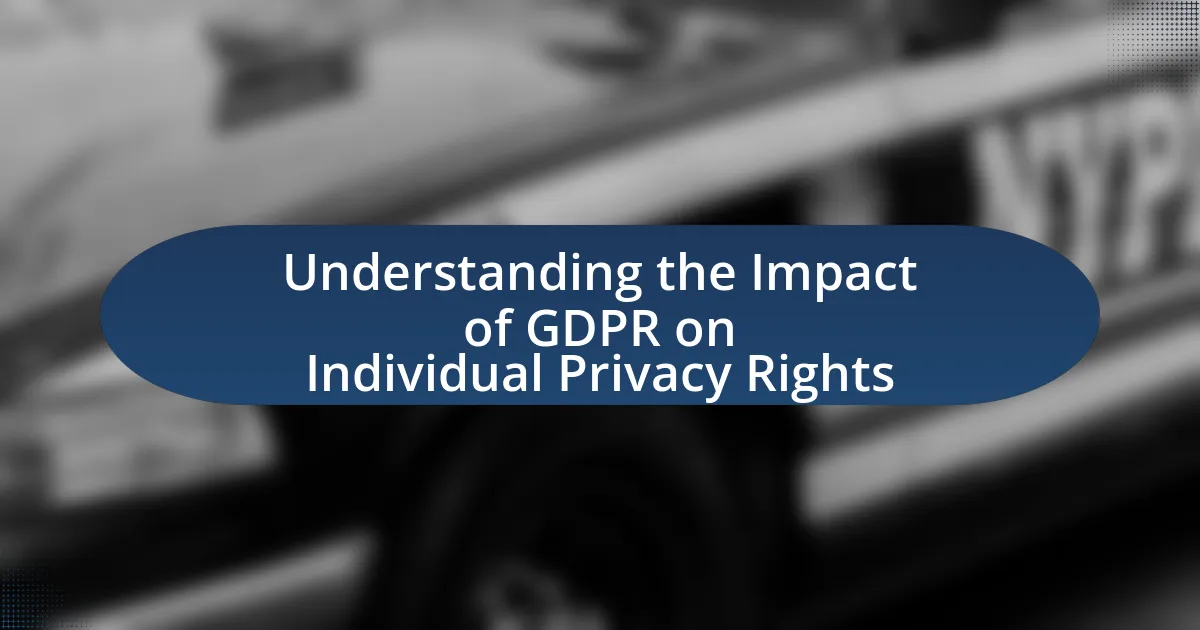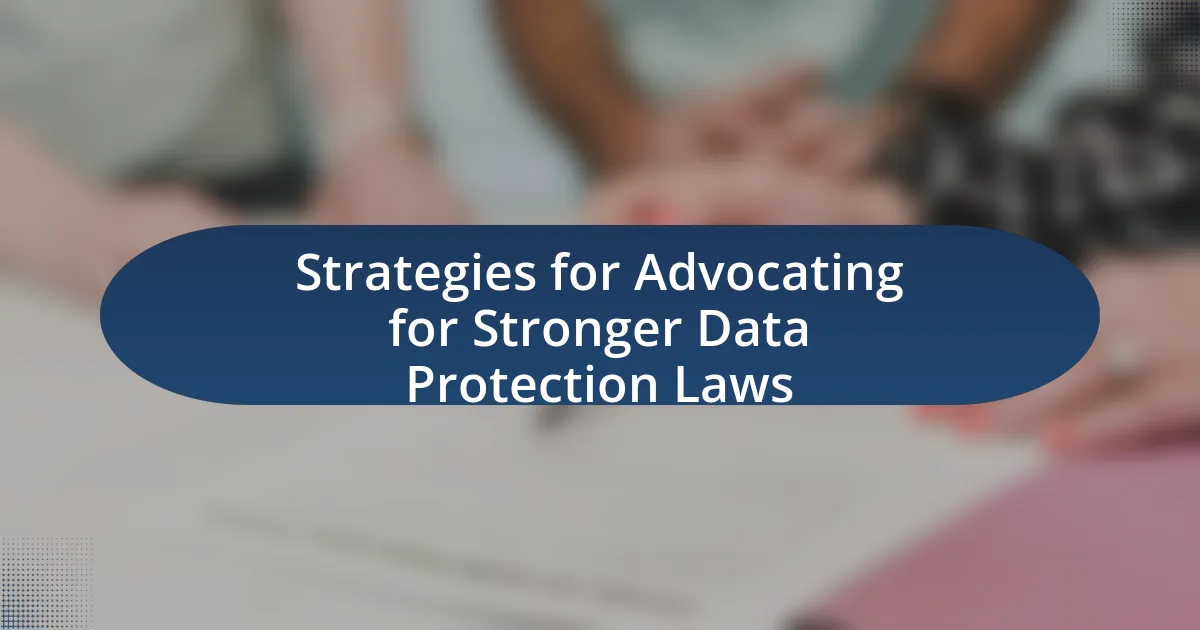Privacy advocacy organizations are dedicated to protecting individuals’ rights to privacy and promoting policies that safeguard personal information. This article analyzes their effectiveness by exploring their functions, roles in society, and methods of engagement with policymakers and the public. It highlights the impact of these organizations on legislation, public awareness, and individual privacy rights, while also addressing the challenges they face, such as funding limitations and opposition from corporations and governments. Additionally, the article discusses best practices for enhancing outreach and engagement, drawing lessons from successful organizations in the field.
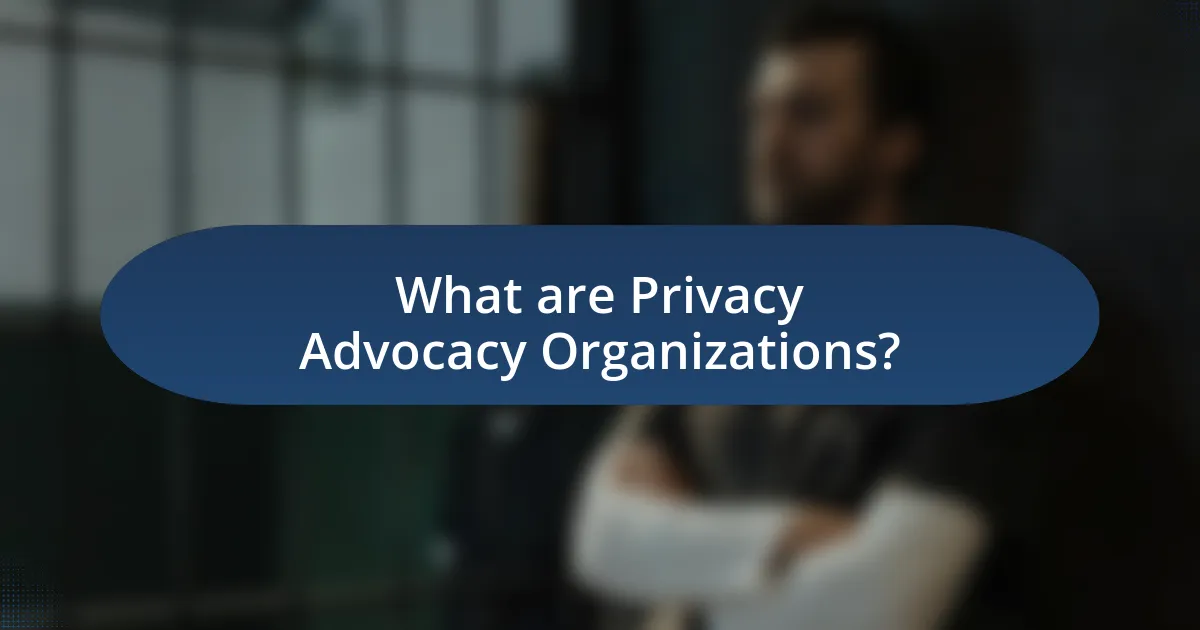
What are Privacy Advocacy Organizations?
Privacy advocacy organizations are groups that work to protect individuals’ rights to privacy and promote policies that safeguard personal information. These organizations engage in activities such as lobbying for stronger privacy laws, educating the public about privacy issues, and providing resources for individuals to understand their rights. For example, the Electronic Frontier Foundation (EFF) has been instrumental in advocating for digital privacy rights and has successfully influenced legislation related to data protection.
How do Privacy Advocacy Organizations function?
Privacy advocacy organizations function by promoting and protecting individuals’ rights to privacy through various strategies, including public education, policy advocacy, and legal action. These organizations engage in research to identify privacy issues, develop policy recommendations, and lobby government entities to enact stronger privacy protections. For instance, the Electronic Frontier Foundation (EFF) actively litigates cases that challenge government surveillance practices, thereby influencing legal precedents and public policy. Additionally, they provide resources and tools to help individuals understand and manage their privacy rights, demonstrating their role as both educators and advocates in the privacy landscape.
What roles do these organizations play in society?
Privacy advocacy organizations play a crucial role in society by protecting individuals’ rights to privacy and promoting data protection policies. These organizations engage in lobbying efforts to influence legislation, educate the public about privacy issues, and provide resources for individuals to understand their rights. For instance, the Electronic Frontier Foundation (EFF) has been instrumental in advocating for digital privacy rights and has successfully influenced laws such as the California Consumer Privacy Act. Their efforts help to raise awareness about the importance of privacy in the digital age, ensuring that individuals are informed and empowered to protect their personal information.
How do they engage with policymakers and the public?
Privacy advocacy organizations engage with policymakers and the public through a combination of direct lobbying, public awareness campaigns, and collaborative initiatives. These organizations often employ lobbyists to influence legislation and regulatory frameworks that affect privacy rights, ensuring that policymakers are informed about the implications of proposed laws. For instance, the Electronic Frontier Foundation has actively participated in legislative discussions, providing expert testimony and drafting policy recommendations. Additionally, they conduct public awareness campaigns to educate citizens about privacy issues, utilizing social media, workshops, and informational resources to foster a more informed public. This multifaceted approach not only raises awareness but also encourages public participation in advocacy efforts, thereby amplifying their impact on policy decisions.
Why are Privacy Advocacy Organizations important?
Privacy advocacy organizations are important because they protect individual rights and promote transparency in data handling practices. These organizations raise awareness about privacy issues, influence policy-making, and hold corporations and governments accountable for their data practices. For instance, the Electronic Frontier Foundation has successfully advocated for stronger privacy laws, contributing to the establishment of regulations like the General Data Protection Regulation in the European Union, which enhances user control over personal data. Their efforts are crucial in ensuring that privacy remains a fundamental right in an increasingly digital world.
What impact do they have on individual privacy rights?
Privacy advocacy organizations significantly enhance individual privacy rights by promoting awareness, influencing legislation, and holding entities accountable for privacy violations. These organizations, such as the Electronic Frontier Foundation and the American Civil Liberties Union, actively campaign for stronger privacy protections and educate the public about their rights. For instance, the General Data Protection Regulation (GDPR) in Europe, influenced by advocacy efforts, has set a global standard for data protection, empowering individuals with rights over their personal data. This demonstrates that the work of privacy advocacy organizations directly contributes to the establishment and reinforcement of legal frameworks that protect individual privacy rights.
How do they influence legislation and regulation?
Privacy advocacy organizations influence legislation and regulation by actively lobbying policymakers, conducting research, and mobilizing public opinion. These organizations often provide expert testimony during legislative hearings, which helps shape the development of laws related to privacy and data protection. For example, the Electronic Frontier Foundation has been instrumental in advocating for stronger privacy protections in various legislative initiatives, such as the California Consumer Privacy Act. Their efforts are supported by data-driven research that highlights the risks of inadequate privacy protections, thereby compelling lawmakers to consider the implications of their decisions.
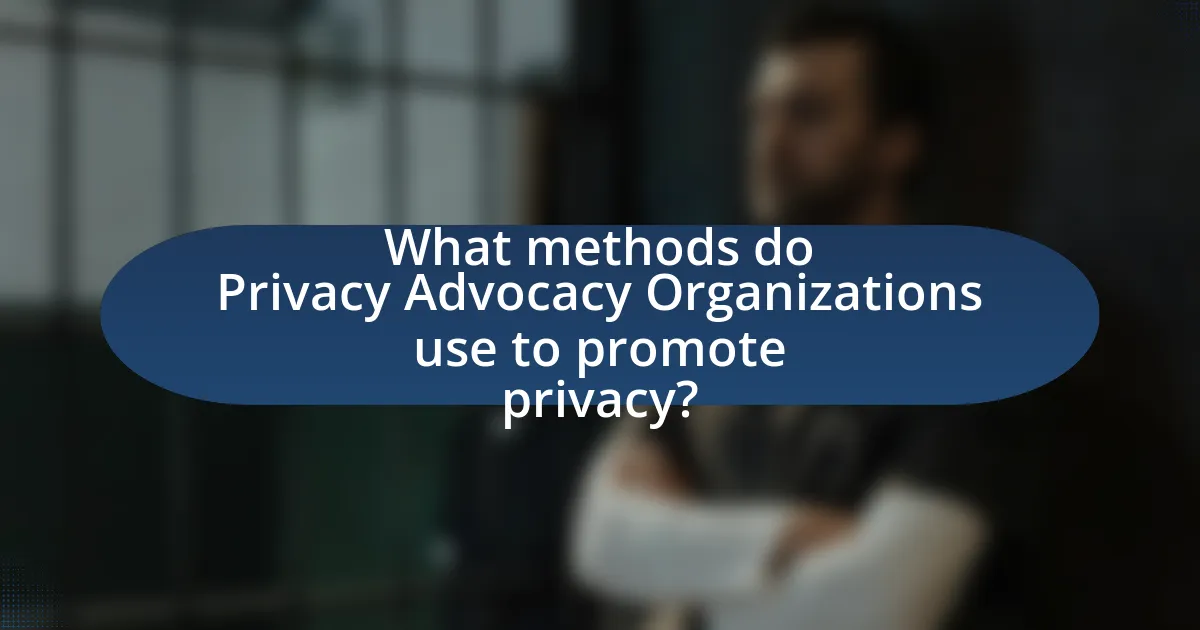
What methods do Privacy Advocacy Organizations use to promote privacy?
Privacy Advocacy Organizations use various methods to promote privacy, including public awareness campaigns, policy advocacy, legal action, and educational initiatives. Public awareness campaigns aim to inform individuals about their privacy rights and the importance of data protection, often utilizing social media, workshops, and informational materials. Policy advocacy involves lobbying for stronger privacy laws and regulations at local, national, and international levels, influencing lawmakers to prioritize privacy issues. Legal action is taken to challenge unlawful data practices and protect individuals’ rights through litigation. Educational initiatives provide resources and training to help individuals and organizations understand privacy risks and best practices, thereby fostering a culture of privacy awareness. These methods collectively enhance public understanding and influence policy changes, contributing to a more privacy-conscious society.
How do they raise awareness about privacy issues?
Privacy advocacy organizations raise awareness about privacy issues through educational campaigns, public outreach, and policy advocacy. These organizations conduct workshops, webinars, and distribute informational materials to inform the public about privacy rights and risks. For instance, the Electronic Frontier Foundation (EFF) regularly publishes articles and guides that explain complex privacy topics in accessible language, helping individuals understand their rights and the implications of data collection. Additionally, they engage in lobbying efforts to influence legislation that protects privacy, demonstrating their commitment to creating a more informed society regarding privacy matters.
What campaigns or initiatives have been successful?
Successful campaigns by privacy advocacy organizations include the European Union’s General Data Protection Regulation (GDPR) and the Electronic Frontier Foundation’s (EFF) “Save the Internet” initiative. The GDPR, implemented in May 2018, has significantly strengthened data protection rights for individuals across Europe, leading to increased compliance and awareness among businesses regarding user privacy. The EFF’s “Save the Internet” campaign successfully mobilized public support against net neutrality rollbacks in the United States, resulting in millions of comments submitted to the Federal Communications Commission, which highlighted the importance of maintaining an open internet. These initiatives demonstrate the effectiveness of advocacy efforts in shaping privacy policies and raising public awareness.
How do they utilize social media and technology?
Privacy advocacy organizations utilize social media and technology to raise awareness, mobilize supporters, and influence policy. They leverage platforms like Twitter and Facebook to disseminate information quickly, engage with the public, and create campaigns that highlight privacy issues. For instance, organizations often use hashtags to promote specific causes, enabling them to reach a broader audience and foster community discussions. Additionally, they employ data analytics tools to assess public sentiment and tailor their messaging effectively. This strategic use of social media has been shown to enhance their visibility and impact, as evidenced by campaigns that have successfully influenced legislation, such as the European Union’s General Data Protection Regulation (GDPR), which was significantly shaped by public advocacy efforts amplified through social media channels.
What strategies do they employ for advocacy?
Privacy advocacy organizations employ strategies such as public awareness campaigns, policy advocacy, and coalition building to promote privacy rights. Public awareness campaigns educate the public about privacy issues through social media, workshops, and informational resources, thereby increasing community engagement. Policy advocacy involves lobbying government officials and participating in legislative processes to influence laws and regulations that protect privacy. Coalition building fosters partnerships with other organizations, enhancing collective impact and resource sharing. These strategies are effective as evidenced by successful campaigns that have led to significant legislative changes, such as the General Data Protection Regulation (GDPR) in the European Union, which was influenced by advocacy efforts.
How do they collaborate with other organizations?
Privacy advocacy organizations collaborate with other organizations through partnerships, joint initiatives, and information sharing. These collaborations often involve co-hosting events, participating in coalitions, and engaging in advocacy campaigns that align with shared goals. For example, organizations like the Electronic Frontier Foundation frequently partner with civil rights groups and technology companies to promote digital privacy legislation, demonstrating the effectiveness of collective action in influencing policy. Such collaborations enhance resource sharing, amplify voices, and increase the impact of advocacy efforts in the realm of privacy rights.
What legal actions have they taken to protect privacy?
Privacy advocacy organizations have taken various legal actions to protect privacy, including filing lawsuits against government surveillance programs and corporations that violate data protection laws. For instance, the Electronic Frontier Foundation (EFF) has successfully challenged the National Security Agency’s mass surveillance practices in court, arguing that they violate the Fourth Amendment rights of individuals. Additionally, organizations like the American Civil Liberties Union (ACLU) have engaged in litigation to enforce compliance with privacy regulations, such as the General Data Protection Regulation (GDPR) in Europe, which mandates strict data handling and user consent protocols. These legal efforts demonstrate a proactive approach to safeguarding individual privacy rights against unlawful intrusions.
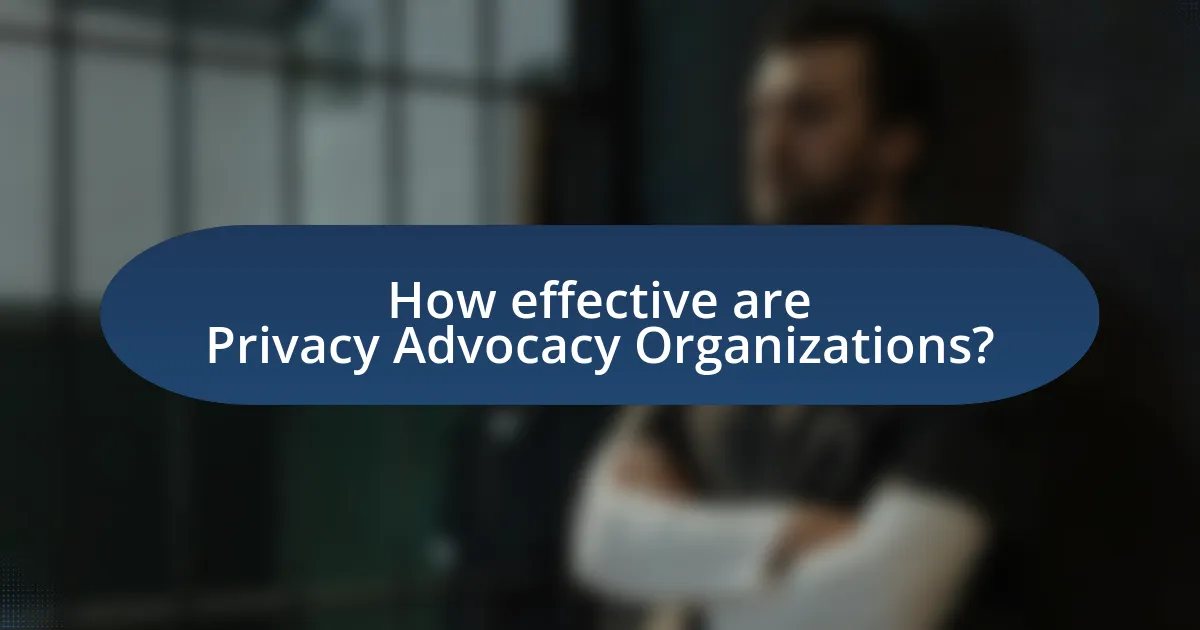
How effective are Privacy Advocacy Organizations?
Privacy advocacy organizations are effective in raising awareness and influencing policy regarding data protection and privacy rights. Their effectiveness is evidenced by successful campaigns that have led to significant legislative changes, such as the General Data Protection Regulation (GDPR) in the European Union, which was influenced by advocacy efforts highlighting the need for stronger privacy protections. Additionally, studies show that public support for privacy rights has increased due to the efforts of these organizations, demonstrating their role in shaping public opinion and driving legislative action.
What metrics are used to measure their effectiveness?
Metrics used to measure the effectiveness of privacy advocacy organizations include public awareness levels, policy changes influenced, membership growth, and engagement in advocacy campaigns. Public awareness can be quantified through surveys that assess knowledge of privacy issues before and after campaigns. Policy changes are tracked by analyzing legislation that incorporates advocacy recommendations, with specific examples such as the General Data Protection Regulation (GDPR) in Europe, which reflects the impact of advocacy efforts. Membership growth is measured by the increase in organizational supporters or donors over time, indicating broader community engagement. Engagement in advocacy campaigns is assessed through participation rates in events, social media interactions, and the number of petitions signed, providing tangible evidence of mobilization efforts.
How do they assess their impact on public policy?
Privacy advocacy organizations assess their impact on public policy through a combination of quantitative metrics, qualitative evaluations, and stakeholder feedback. They often analyze legislative changes, track the adoption of privacy regulations, and measure shifts in public awareness and opinion regarding privacy issues. For instance, organizations may utilize surveys to gauge public sentiment before and after advocacy campaigns, providing concrete data on their influence. Additionally, they may review case studies of successful policy changes attributed to their efforts, such as the implementation of the General Data Protection Regulation (GDPR) in Europe, which reflects the effectiveness of advocacy in shaping significant legal frameworks.
What feedback do they receive from the communities they serve?
Privacy advocacy organizations receive feedback from the communities they serve that often highlights a demand for greater transparency and accountability in data practices. Community members express concerns about data privacy violations and seek more robust protections against surveillance. For instance, surveys conducted by organizations like the Electronic Frontier Foundation indicate that 85% of respondents are worried about their personal data being misused. This feedback underscores the need for advocacy groups to address these concerns through policy changes and public awareness campaigns.
What challenges do Privacy Advocacy Organizations face?
Privacy Advocacy Organizations face significant challenges, including limited funding, regulatory hurdles, and public awareness issues. Limited funding restricts their ability to conduct research, launch campaigns, and influence policy effectively. Regulatory hurdles arise from complex legal frameworks that can hinder their advocacy efforts, making it difficult to navigate privacy laws and compliance requirements. Additionally, public awareness issues mean that many individuals are unaware of their privacy rights, which diminishes the impact of these organizations’ efforts to promote privacy protection. According to a report by the Electronic Frontier Foundation, these challenges significantly impede the effectiveness of privacy advocacy in shaping policy and raising public consciousness about privacy rights.
How do funding and resources affect their operations?
Funding and resources significantly impact the operations of privacy advocacy organizations by determining their capacity to conduct research, engage in public education, and influence policy. Adequate funding allows these organizations to hire skilled staff, develop comprehensive advocacy strategies, and sustain long-term initiatives. For instance, organizations with robust financial backing can afford to launch extensive campaigns, such as the Electronic Frontier Foundation, which utilizes its resources to litigate cases that shape digital privacy laws. Conversely, limited funding restricts operational capabilities, leading to reduced outreach and advocacy efforts, as seen in smaller organizations that struggle to maintain staff or secure necessary technology for effective advocacy.
What opposition do they encounter from corporations or governments?
Privacy advocacy organizations encounter significant opposition from corporations and governments primarily through lobbying efforts and regulatory pushback. Corporations often resist privacy regulations that could limit their data collection practices, as seen in the tech industry’s opposition to the General Data Protection Regulation (GDPR) in Europe, which imposed strict data protection requirements. Governments may also oppose privacy advocacy by enacting laws that prioritize surveillance and data access for national security, such as the USA PATRIOT Act, which expanded government surveillance capabilities. These actions demonstrate a concerted effort by both entities to maintain control over data practices, often at the expense of individual privacy rights.
What are the best practices for Privacy Advocacy Organizations?
The best practices for Privacy Advocacy Organizations include transparency, community engagement, and data protection. Transparency involves openly sharing organizational goals, funding sources, and decision-making processes, which builds trust with stakeholders. Community engagement is crucial; organizations should actively involve the public in discussions about privacy issues, ensuring diverse voices are heard. Data protection practices must be robust, including implementing strong security measures to safeguard sensitive information and advocating for policies that enhance individual privacy rights. These practices are supported by studies showing that transparency and community involvement significantly increase public trust and participation in privacy advocacy efforts.
How can they improve their outreach and engagement?
Privacy advocacy organizations can improve their outreach and engagement by leveraging data-driven strategies and enhancing their digital presence. Utilizing analytics tools to track audience behavior allows these organizations to tailor their messaging and outreach efforts effectively. For instance, a study by the Pew Research Center found that targeted social media campaigns can increase engagement rates by up to 50%. Additionally, collaborating with influencers in the privacy space can amplify their message, as partnerships have been shown to expand reach and credibility. Engaging in community events and webinars also fosters direct interaction, which can enhance trust and involvement among stakeholders.
What lessons can be learned from successful organizations?
Successful organizations demonstrate the importance of clear communication and a strong mission. These organizations often prioritize transparency, which fosters trust among stakeholders and enhances their credibility. For instance, the Electronic Frontier Foundation (EFF) effectively communicates its goals and activities, leading to increased public support and engagement. Additionally, successful organizations leverage data-driven decision-making to adapt strategies based on measurable outcomes, as seen in the practices of the American Civil Liberties Union (ACLU), which utilizes research to inform its advocacy efforts. These lessons highlight the significance of transparency and data utilization in achieving organizational effectiveness.
